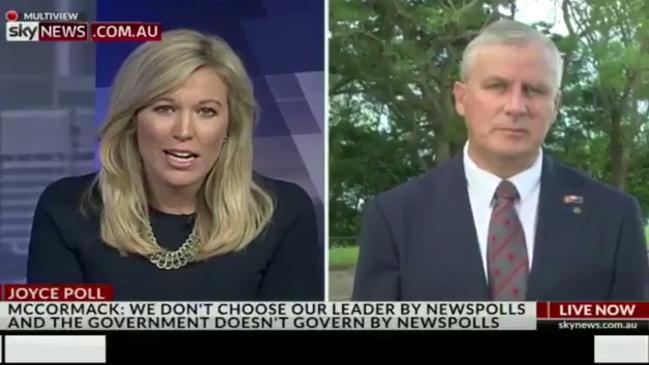The Nationals will park where they want
THE fate of Barnaby Joyce’s position as Nationals leader is by no means clean cut. After all, they seem to operate by their own rules.

ANALYSIS
IT’S the oldest trick in the double-parking caper and the man who might replace Barnaby Joyce was involved.
Around 9pm two Wednesdays ago a car pulled up in Kingston, a busy restaurant precinct of Canberra.
It was double-parked by the driver, who swiftly jumped out and raised the bonnet. That’s how he left the vehicle, apparently in mechanical distress.
The driver disappeared for only a minute or so and then returned with arms around what might have been a sizeable takeaway from one of the splendid eateries across the road from his stranded vehicle.
The bonnet was slammed down, mechanical disorder apparently repaired, and it left the scene.
It’s not known who the driver was, but the car was marked with the name and promotional material of Michael McCormack, the Veterans Affairs’ Minister from Wagga Wagga and one in the small group of National Party MPs who might replace Barnaby Joyce as party leader.
Mr McCormack was not the driver, though.
As it happened, the parking pantomime was witnessed by journalists who had gathered in a nearby restaurant — directly across the road from the vehicle — to honour the memory of a departed colleague.

It was a minor incident but an informative one.
It could be used as an indication of how the Nationals operate by their own rules, even traffic ordinances.
And that’s one reason why the issue of Barnaby Joyce’s fate is by no means clean-cut.
One issue indicating Mr Joyce might stay put, no matter the public condemnation of his personal conduct, is the argument his private life should not become a political battlefield, no matter that Prime Minister Malcolm Turnbull has said it had appalled Australians.
There is a legitimate privacy argument to be discussed, and the political aim of Mr Joyce ensuring his behind-closed-doors activities aren’t used to measure his character and judgment.
Second, Mr Joyce has been good at his job. He has inserted the Nationals into policy areas much bigger than the party’s status might warrant. That includes into the huge mining and agricultural industries.
At the same time, he has promoted the Nationals through the party’s constituencies, mainly in NSW and Queensland, by being larger than life and depicting the party on the same scale.
Mr Joyce’s abilities could save him, even if the accusation might be made that he was saved by the mediocrity of his colleagues.
Further, the Nationals don’t like being pushed around, whether by Labor, the Greens or One Nation. And in particular, by the Liberals.

This strengthens the tribal bonds of the group — just 21 out of 226 MPs — which have been essential to self-preservation in Coalition partnership with the Liberals. The more Liberals look down their noses at the Nats, the more the junior mob bands together.
That’s why Malcolm Turnbull had to back off any suggestion he was trying to intrude in party affairs with his demotion and criticism of Mr Joyce.
Even when lumped together as the Queensland Liberal National Party, the Nationals prefer to retain their party identity in Canberra.
There is also the difficulty of the party expanding to include a number of clashing viewpoints as life becomes more complex and the bush becomes less homogenous.
Prominent MPs include Darren Chester in Victoria, who supported same-sex marriage, and George Christensen in Queensland, who vigorously didn’t.
Accommodating that spread of views is not a simple task in a Coalition Government which is pushing the tolerance of some Nationals.
This is no ordinary leadership challenge, not even in Australia where we seem to have gone through all the permutations over the past 27 years.
And in the end the Nationals will conduct matters as they wish; they will park where they want.



